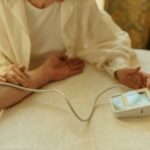As a doctor-founded care service, we understand how heart disease affects daily life and breathing. Our clinical team regularly supports families managing these complex conditions at home. This guide explains the connection between heart and lung function, helping you recognise symptoms and know when to seek support.
Heart disease and the respiratory system
So, how does coronary heart disease affect the respiratory system? The heart and the lungs are closely connected. Far from being independent organs, they work together to ensure that all the cells in your body receive the oxygen they need to survive.
For most of us, breathing is spontaneous and effortless, but sometimes it can become a challenge. Lung and respiratory system complications like infections, allergies, asthma and bronchitis can all lead to difficulties breathing. Sometimes breathlessness could be an indication that there’s a problem with your heart.
How does heart disease affect the respiratory system?
The heart pumps blood around the body, but first it pumps it to the lungs to ensure that the red blood cells are topped up with essential oxygen. It’s an incredible process:
When you breathe in, oxygen enters your lungs and moves into the bloodstream. It attaches to haemoglobin in red blood cells and is carried by the heart around the body.
Your cells use this oxygen to produce energy and release carbon dioxide. This waste gas travels back to the lungs in the blood and is breathed out, ready for the cycle to begin again.
How the heart can affect breathing
This is a delicate and finely balanced system. When something goes wrong, it can have enormous effects. If the heart is diseased or damaged and can’t pump efficiently, it can significantly affect the lungs. This means that breathing can be impaired.
“We often see families worried about these respiratory changes, understanding the connection between heart and lung function helps families recognise when to seek medical advice and what support might help at home.”
Dimple Chandarana – Head of Clinical Governance at Hometouch
Heart failure
Coronary artery disease, heart attack, high blood pressure, irregular rhythms and valve abnormalities can all take their toll on your heart. They affect its ability to pump properly. The organ can become weaker and weaker until it is unable to effectively send blood around the body.
The blood tends to back up in the body, and fluid passes into the tissues. This leads to swelling. This congestion is the reason heart failure is often called congestive cardiac failure. In the early stages, the breathlessness may only be noticeable when you’re exercising. Later, when the heart isn’t working well, you may feel tired, weak and short of breath, even at rest.
You might also notice waking suddenly at night, feeling breathless. Many people need several pillows to sleep comfortably. These signs suggest the heart is struggling to manage fluid levels.
Pulmonary oedema
Pulmonary oedema occurs when fluid builds up inside the lungs. When liquid collects in the air spaces, the ability of the lungs to oxygenate blood is affected. It can be a scary and unpleasant condition, leaving you gasping for breath.
Pulmonary oedema can be caused by lung disease. When heart failure is more serious, the pressure of blood in the lungs builds up, pushing fluid into the air sacs. This is how heart failure can lead to respiratory failure.
People living with pulmonary oedema will feel breathless, weak and unwell. You may cough up pink, frothy stuff and notice that the shortness of breath is often worse at night when you’re lying down. The effects of gravity mean that excess fluid from puffy ankles or legs comes back into the system. This makes it more difficult for the heart to cope.
Lying flat, the fluid in the lungs can make you feel as if you’re drowning. Sleeping propped up with pillows can help, but if you’re suffering from any of these symptoms, it’s important to get emergency medical support.
Heart attack
A heart attack happens when one of the main arteries carrying blood to the heart becomes blocked. This means the muscle will be starved of the oxygen it needs to survive. This causes pain but can also lead to feeling short of breath.
Without rapid treatment, part of the heart muscle can die. This makes the heart less effective at pumping blood and increases the risk of breathlessness and heart failure.
Heart rate irregularities
Your heart’s regular pattern of beats is controlled by the body’s electrical circuit. Short-circuits, heart attacks, health problems, alcohol and caffeine can all affect this process. This leads to a rapid or irregular beat. When the heart beats too fast, usually more than 100 beats per minute, it’s called tachycardia.
If the heart rate is too fast, it can be difficult for the muscle to pump the blood effectively. This leads to breathlessness, sometimes fainting and collapse.
When to seek medical help
It’s essential to get immediate medical attention if you have trouble breathing, especially if you or someone you love experiences:
- Breathlessness that comes on suddenly or worsens quickly
- Breathlessness when lying flat
- Chest pain, palpitations or a racing heartbeat
- Clammy, grey or unusually pale skin
- Severe anxiety or distress linked to breathing
Call 999 if someone appears acutely unwell. Stay with them while offering reassurance until they get the treatment they need.
Support for living with heart disease at home
Living with heart disease brings uncertainty and fatigue. Our clinical team provides both expert guidance and reassurance, helping families navigate this challenging condition with confidence.
With the right support at home, many people continue to live independently in familiar surroundings. Our carers receive specialist training from our clinical team to support people living with heart disease. We’ll match you with a carer who understands both the medical requirements and your loved one’s unique needs.
Whether you need companionship, help with daily routines or round-the-clock live-in care, we create a custom care plan that adapts as needs change. This personalised approach maintains dignity and independence while ensuring safety and comfort at home.
Talk to one of our care experts about support for heart disease – no pressure, just clear guidance when you need it most.




